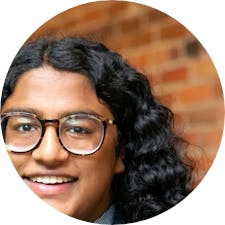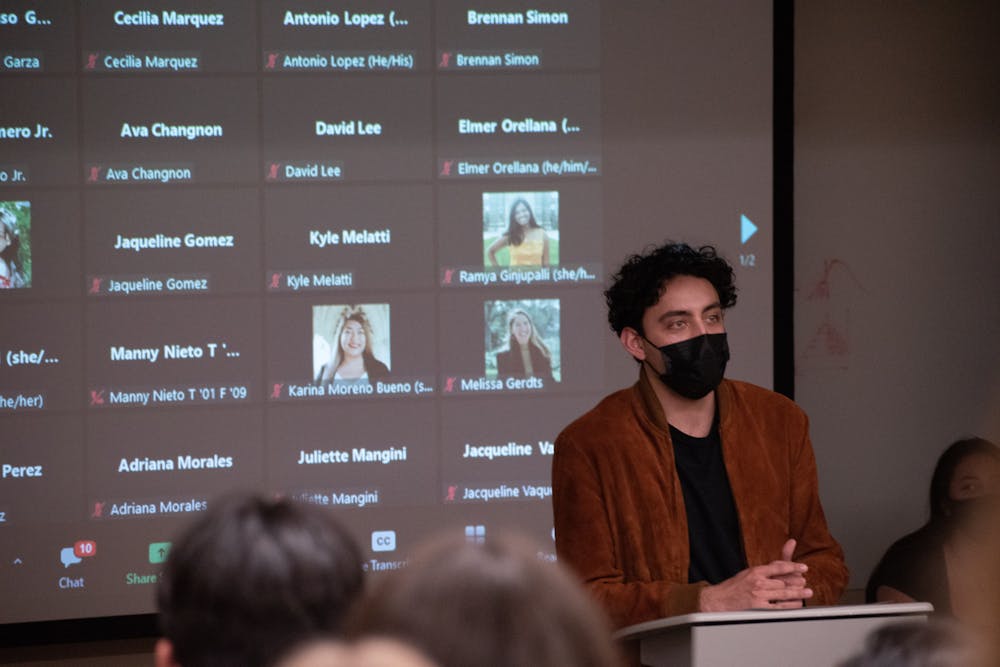A coalition of Duke Latinx student organizations hosted a hybrid teach-in to discuss a list of Latinx student demands on Wednesday night.
A number of speakers, including current students, alumni and professors, spoke to a crowd of over 120 attendees about on-campus Latinx student organizing. They emphasized Duke’s long history of Latinx student organizing and emphasized multicultural solidarity. While recognizing past successes, the speakers encouraged students to continue to fight for further support for marginalized groups.
The list of demands was announced in a Jan. 28 guest column in The Chronicle.
Senior Carlo-Alfonso Garza, founder of Duke Latinx Business Organization, opened the event on a strong note, referencing Duke’s history of Latinx student organizing.
“This isn’t the first round of Latinx demands,” Garza said. “The first one was in 1994. We will not be going away. President Price will engage with us. Change can happen.”
Sebastian Ochoa and Sophia Vera, co-presidents of Mi Gente, then elaborated on the role of Latinx students at Duke.
“The university depends on Latinx students to participate and encourage prospective new Latinx acceptances, via [Latino Student Recruitment Weekend], in order to maintain a diverse student population, yet ignores our needs year-round…this is not the two-way street that it should be,” Ochoa said.
“We as a community are utilizing our agency and our voice to uplift demands that have been unmet since 1997,” Vera said.
Later, Axel Herrera, co-founder of Define America, criticized the University’s “performative” changes and hesitance to work directly with student groups.
“As much as [Duke] aspires to be equitable and diverse, as an institution the hierarchy it has is not made for that democratic equitable process,” Herrera said. “You have to live with that contradiction, and work against it.”
Another speaker was senior Shania Khoo, vice president of Duke Asian Students Association, who stressed the importance of multicultural solidarity, referencing demands made by different minority student groups in the past.
“These demands, even if presented separately, are inherently connected and constantly built on one another,” Khoo said. “The safety and survival of people of color are made possible because of advocacy and activism by our own community.”
Cecilia Márquez, assistant professor in history and curator of the “Nuestra Historia, Nuestra Voz” exhibit in Perkins Library, shared supportive words with the attendees.
“Although these demands may be treated with hostility in the coming days, I hope you know that they are gifts that you have given to Duke,” Márquez said. “Demands are part of a long history of student activism on this campus.”
Other speakers included Elizabeth Barahona, Trinity ‘18, and Melissa Leal, Trinity ‘21, and Faiz Sikaffy, Pratt ‘21, former presidents of Duke Latin American Student Organization.
Barahona, who co-organized 2016 protests while at Duke, shared the experience of making and advocating for Latinx demands in previous years.
“[In 2016] we got Native students’ space, and Asian American students’ place and La Casa…although not all our demands were met, we left a legacy of activism and the community that we’re experiencing right now,” Barahona said.
Elmer Orellana, former student development coordinator and assistant director of the Center for Multicultural Affairs, advised students on how to continue fighting for these new demands to be met.
“We come from a lineage of warriors, healers, and activists who have paved the way to care in our community,” Orellana said. “Remember to rest and take care of one another.”
Herrera, one of the speakers, expressed gratitude after the event for the work that on-campus groups were doing.
“I’m proud of students stepping up, organizing this, being prepared and having a strategy,” Herrera said.
Junior Kevin Rocha, who attended the event, was optimistic about the demands and hopeful for the future.
“I think this event was amazing. It is great to see how much we’ve done, but we know that there’s a lot more work to be done,” Rocha said.
The event ended with a poetry reading by sophomore Laura Poma and a call to action, where attendees were encouraged to email administrators about the proposed demands.
For the speakers at this event, this set of demands is novel, but not a departure from the past. They framed this movement as a continuation of a long history of Latinx student organizing on campus: one they hope will be heard and taken seriously by the University administration.
Get The Chronicle straight to your inbox
Signup for our weekly newsletter. Cancel at any time.

Vishal Jammulapati is a Trinity sophomore and an associate news editor of The Chronicle's 118th volume.

